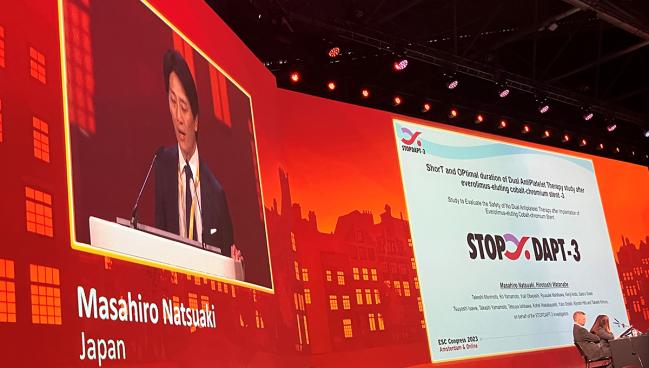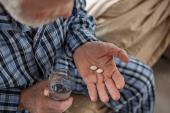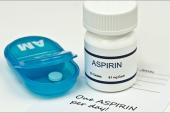STOPDAPT-3: Don’t Skip Out on Aspirin Immediately After PCI
(UPDATED) The findings should make clinicians cautious about going without aspirin right away, Manesh Patel says.

AMSTERDAM, the Netherlands—Among patients with ACS, a high bleeding risk, or both, going without aspirin and using P2Y12 inhibitor monotherapy in the first month after PCI doesn’t seem to be a winning strategy, according to the results of the randomized STOPDAPT-3 trial.
Compared with dual antiplatelet therapy (DAPT) with prasugrel and aspirin, prasugrel alone did not reduce major bleeding and appeared to increase the risk of some coronary events, including subacute stent thrombosis and unplanned revascularization, through 1 month of follow-up, Masahiro Natsuaki, MD, PhD (Saga University, Japan), reported here at the European Society of Cardiology Congress 2023.
Guidelines recommend at least a short duration of DAPT after PCI before switching to single antiplatelet therapy, with the advised length of treatment varying across clinical scenarios, but the incidence of major bleeding within the first month after the procedure remains high, especially among patients with ACS or a high bleeding risk, he noted.
The concept explored in this trial, bolstered by data from a pilot study, was that forgoing the aspirin altogether post-PCI could lessen bleeding without paying a price in terms of increased coronary events. But that’s not how it worked out.
“Dual antiplatelet therapy should remain the standard strategy within 1 month after coronary stent implantation,” Natsuaki concluded.
Speaking with TCTMD, Manesh Patel, MD (Duke Clinical Research Institute, Durham, NC), a member of the American Heart Association’s national board of directors, noted that the lower dose of prasugrel used in Japan—and in this trial—versus other parts of the world makes it difficult to extrapolate the findings beyond the population studied.
Nevertheless, he commented, “with that caveat, [the trial is] still important enough to tell us that there could be a risk of stent thrombosis early in these patients, and that caution would make me [want to] have at least some period of dual antiplatelet therapy.”
Dropping Aspirin
STOPDAPT-3, conducted at 72 centers in Japan, enrolled patients with ACS (about 75%) and/or a high bleeding risk (about 55%) who were undergoing PCI with an everolimus-eluting stent. The main analysis included 5,966 patients (mean age 71.6 years; 23.4% women) randomized after coronary angiography to prasugrel monotherapy or DAPT with prasugrel and aspirin.
Patients in both groups received a 20-mg prasugrel loading dose, followed by a daily maintenance dose of 3.75 mg for 1 month. Those in the DAPT arm additionally received a daily aspirin dose of 81 to 100 mg, with a loading dose of 162 to 200 mg used in patients who were aspirin-naive.
There were two primary endpoints, assessed at 1 month:
- Major bleeding (BARC 3 or 5), with a superiority analysis
- Cardiovascular events (composite of CV death, MI, definite stent thrombosis, or ischemic stroke), with a noninferiority analysis
Skipping aspirin did not significantly reduce major bleeding compared with DAPT (4.47% vs 4.71%; HR 0.95; 95% CI 0.75-1.20).
The strategy proved to be noninferior to DAPT for cardiovascular events since the upper end of the confidence interval fell below 50% (4.12% vs 3.69%; HR 1.12; 95% CI 0.87-1.45; P = 0.01 for noninferiority).
However, the patients treated with prasugrel monotherapy had significantly higher rates of subacute definite or probable stent thrombosis (0.58% vs 0.17%; HR 3.40; 95% CI 1.26-9.23) and any unplanned coronary revascularization (1.05% vs 0.57%; HR 1.83; 95% CI 1.01-3.30). Other outcomes, including death, MI, definite/probable stent thrombosis, definite stent thrombosis, ischemic stroke, TLR, and non-TLR, occurred at similar rates in the two arms of the trial.
The findings regarding the primary endpoints were consistent in ACS and non-ACS patients and regardless of whether patients received aspirin or any antiplatelet therapy in the 7 days before randomization.
‘Doesn’t Seem to Be a Good Idea’
As for why eliminating aspirin from the post-PCI regimen wouldn’t reduce bleeding, Natsuaki pointed to multiple possible reasons. There could have been differences in the types of bleeding recorded immediately after PCI in STOPDAPT-3 and those observed in trials focused on the chronic phase after PCI—for instance, GI bleeding occurred in only 15% of patients in the current trial, much lower than the roughly 50% of participants in previous trials.
Moreover, any potential reduction in bleeding could have been diluted by the effects of extensive antithrombotic management before and during the procedure, or it could be that anticoagulation has more of an impact on bleeding than does antiplatelet therapy, Natsuaki said.
And from the perspective of thrombotic risk, he added, “aspirin used for a limited period of 1 month after PCI might have exerted a protective effect on the vulnerable coronary lesions without a large increase in major bleeding.”
In a discussion following a presentation of the results at a press conference, moderator Steen Dalby Kristensen, MD, DMSc (Aarhus University Hospital, Denmark), also noted that the doses of prasugrel used in STOPDAPT-3 are much lower than those used in the Western world—about one-third of the typical dose. But despite the difference in dosing, he said, “I think the results are very interesting and sort of [show] that skipping aspirin within the first month doesn’t seem to be a good idea.”
Natsuaki explained that the lower dose used in the trial is related to the relatively low ischemic risk and relatively high bleeding risk of Japanese patients, acknowledging that caution should be used when generalizing these results to other populations. He indicated that there is a need to await the results of ongoing trials—such as LEGACY—to gain more information about the utility of aspirin-free strategies.
In the meantime, Patel said, “I do think these are going to be important data as we think about these studies moving forward.”
Serving as a discussant after Natsuaki’s presentation, Marco Valgimigli, MD, PhD (Cardiocentro Ticino, Lugano, Università della Svizzera italiana (USI); University of Bern, Switzerland), said STOPDAPT-3 was a well-designed, well-conducted study, one that was well-powered at least for the superiority analysis of major bleeding. The noninferiority margin was generous for the analysis of CV events, he noted.
The results, and the implications for practice, are clear, he said: “Aspirin remains a cornerstone treatment in the periprocedural and acute phase of PCI in patients without indication [for] oral anticoagulation.”
Valgimigli noted, however, that STOPDAPT-3 leaves several questions unresolved, pointing to issues around the type and dose of P2Y12 inhibitor monotherapy used; the target population (this was mostly an ACS cohort and not a pure high-bleeding-risk cohort); the role of intravascular imaging, which was employed routinely; and the role of peri- versus postprocedural aspirin administration.
Todd Neale is the Associate News Editor for TCTMD and a Senior Medical Journalist. He got his start in journalism at …
Read Full BioSources
Natsuaki M. An aspirin-free versus dual antiplatelet strategy for coronary stenting: STOPDAPT-3 randomized trial. Presented at: ESC 2023. August 26, 2023. Amsterdam, the Netherlands.
Disclosures
- STOPDAPT-3 was funded by Abbott Medical Japan.
- Natsuaki reports no relevant conflicts of interest.
- Natsuaki reports honoraria from Abbott Medical Japan, Daiichi Sankyo, and Bayer.





Comments